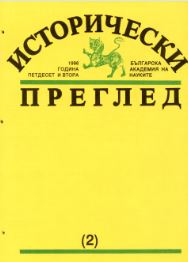Характерни особености на руската имперска политика
Basic Features of Russia’s Imperial Policy
Author(s): Plamen TzvetkovSubject(s): History, Political history, Middle Ages, Modern Age, Recent History (1900 till today)
Published by: Институт за исторически изследвания - Българска академия на науките
Summary/Abstract: There is remarkable continuity in Russia's foreign policy from the late Middle Ages to nowadays. Pan-Slavism was based on the denial of the very existence of separate Slavic peoples which were simply considered “tribes” of one nation and these “tribes” had to be unified under the scepter of Russia’s autocrats. Moreover, a number of non-Slavic nations like the Rumanians, Albanians, and Bulgarians were arbitrary declared “Slavs” in order to justify Russia's strife for conquering them. These theories found a natural continuation in the communist dogma about nations as a provisional product of capitalism. The subversive tactics of the Russian tsars who corrupted the parliaments of the Polish-Lithuanian Kingdom and of Bulgaria in order to prepare these two countries annexation was developed further in the Comintern strategy of exporting the "proletarian revolution" to the whole world. As a matter of fact, though, both the tsar and the general secretaries of the Soviet Communist Party preferred the traditional wars of conquest as a main instrument of territorial expansion.
Journal: Исторически преглед
- Issue Year: 1996
- Issue No: 2
- Page Range: 80-92
- Page Count: 13
- Language: Bulgarian
- Content File-PDF

